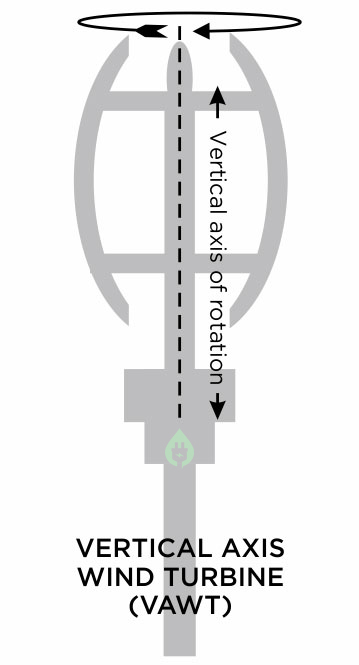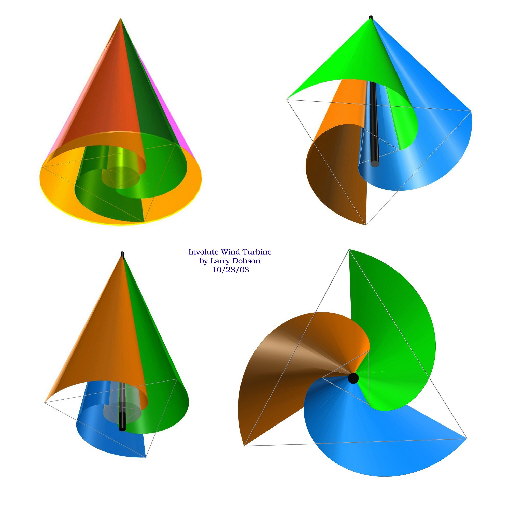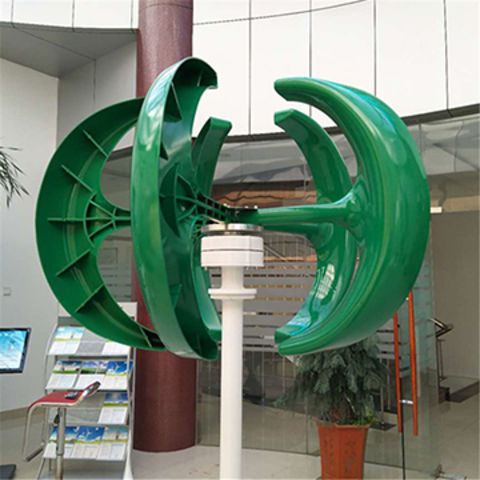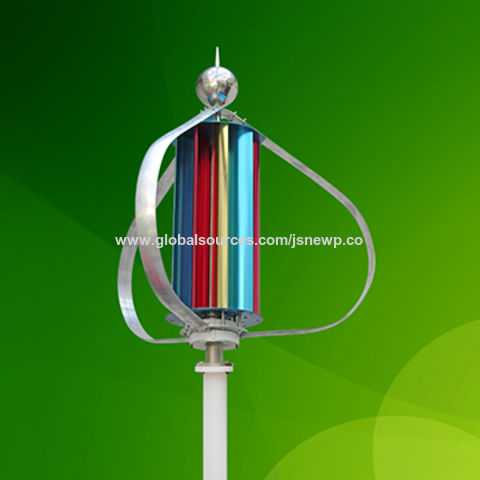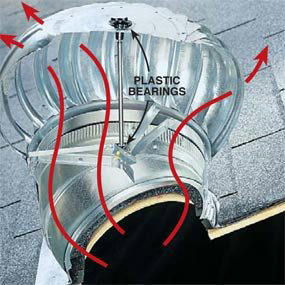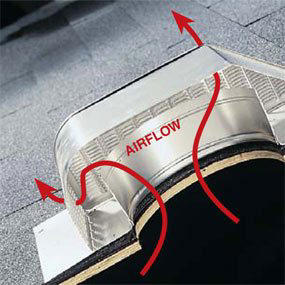New Mars Forums
You are not logged in.
- Topics: Active | Unanswered
Announcement
#26 2021-04-24 19:49:32
- louis
- Member
- From: UK
- Registered: 2008-03-24
- Posts: 7,208
Re: Vertical Wind Turbine - better than you might think
Hmm - that is totally counter intuitive. Assuming a traditional wind turbine design with three horizontal blades, whatever the wind force is doing it's got to push those blades up (against gravitational force) to the 12 o'clock position after which the blades will fall (thanks to gravitational force). Surely the low G makes it easier to get the blade up to the 12 o'clock position.
gravity has nothing to do with how easy it is to move a wind turbine blade. That has to do with force acting on mass, and mass is unaffected by gravity. Doesn't matter which way the turbine axis is oriented, either.
Let's Go to Mars...Google on: Fast Track to Mars blogspot.com
Offline
Like button can go here
#27 2021-04-24 20:48:54
- SpaceNut
- Administrator
- From: New Hampshire
- Registered: 2004-07-22
- Posts: 29,932
Re: Vertical Wind Turbine - better than you might think
Offline
Like button can go here
#28 2021-04-25 09:43:43
- GW Johnson
- Member
- From: McGregor, Texas USA
- Registered: 2011-12-04
- Posts: 6,110
- Website
Re: Vertical Wind Turbine - better than you might think
The blades balance each other, Louis.
GW
GW Johnson
McGregor, Texas
"There is nothing as expensive as a dead crew, especially one dead from a bad management decision"
Offline
Like button can go here
#29 2021-04-25 12:46:18
- Calliban
- Member
- From: Northern England, UK
- Registered: 2019-08-18
- Posts: 4,271
Re: Vertical Wind Turbine - better than you might think
Frictional forces will be reduced on Mars - all else being equal, they will be 37.5% of what they would be on Earth. So there might be a slight advantage here. Maybe someone can dig out the numbers for frictional energy losses in a wind turbine? The problem is, that regardless of how much or how little friction accounts for, a 100m diamter turbine can never produce more than 10.8kw of mechanical power, because that is the limit imposed by the kinetic energy of the atmosphere that passes through the blades. That is such a pathetically small amount of power for a machine that size. I really cannot see it being worth the effort. The ERoEI over its lifetime is going to be less than one.
And I say 'all else being equal'. But of course it isn't. At 6mbar, ordinary lube oil would be subject to evapouration, which will tend to raise it's viscosity over time. And at -60C, it is going to wax out. When that happens, friction in the turbine will prevent it from turning. So your wind turbine rotor bearings will need to be heated. How much of that precious 10.8kw will that consume? I'm thinking probably all of it and more.
Wind power is a marginal energy source on Earth. It is unworkable on Mars, even more so than solar power.
Last edited by Calliban (2021-04-25 12:53:05)
"Plan and prepare for every possibility, and you will never act. It is nobler to have courage as we stumble into half the things we fear than to analyse every possible obstacle and begin nothing. Great things are achieved by embracing great dangers."
Offline
Like button can go here
#30 2021-04-25 12:52:48
- GW Johnson
- Member
- From: McGregor, Texas USA
- Registered: 2011-12-04
- Posts: 6,110
- Website
Re: Vertical Wind Turbine - better than you might think
Those frictional forces that depend on weight will be reduced on Mars. Other frictional forces (like shaft bearing friction and aerodynamic drag) do not depend on weight, and so will not be reduced on Mars.
GW
GW Johnson
McGregor, Texas
"There is nothing as expensive as a dead crew, especially one dead from a bad management decision"
Offline
Like button can go here
#31 2021-04-25 12:58:58
- SpaceNut
- Administrator
- From: New Hampshire
- Registered: 2004-07-22
- Posts: 29,932
Re: Vertical Wind Turbine - better than you might think
Not sure if this gets the numbers but
https://electricalacademia.com/renewabl … odynamics/
A typical drag coefficient for wind turbine blades is 0.04; compare this to a well-designed automobile with a drag coefficient of 0.30.
https://electricalacademia.com/renewabl … odynamics/
https://en.wikipedia.org/wiki/Wind_turbine_aerodynamics
http://gcep.stanford.edu/pdfs/energy_wo … _rooij.pdf
https://www.osti.gov/etdeweb/servlets/purl/356238
https://www.osti.gov/etdeweb/servlets/purl/618185
https://www.rpc.com.au/pdf/wind4.pdf
https://m-selig.ae.illinois.edu/pubs/Sa … iblets.pdf
https://www.ijaiem.org/Volume4Issue4/IJ … -29-74.pdf
With mars being so dusty this also applies
https://m-selig.ae.illinois.edu/pubs/Sa … rosion.pdf
Offline
Like button can go here
#32 2021-05-02 20:12:42
- SpaceNut
- Administrator
- From: New Hampshire
- Registered: 2004-07-22
- Posts: 29,932
Re: Vertical Wind Turbine - better than you might think
I found this interesting little wind turbine powerpod generating unit
The wind hits the sides of the structure and rises along the sides entering under the top in a small entrance location that hits the fan or windmill blades that are inside to cause the air to flow out the gap between the top and the base.
http://kazhugupaarvai.tech/powerpod-the … bine-ever/
its billed as a child safe unit....
the output is defined as 1 kw but I am still looking for more information on the company Halcium
Offline
Like button can go here
#33 2021-11-24 15:38:15
- SpaceNut
- Administrator
- From: New Hampshire
- Registered: 2004-07-22
- Posts: 29,932
Re: Vertical Wind Turbine - better than you might think
Say its not so Wind power risks becoming too cheap, says top turbine maker
For what size windmill?
Wind turbine makers' operating margins are also being squeezed by rising costs stemming from the supply crunch and high prices for raw material such as steel.
Both Siemens Gamesa and its main rival Vestas have said they have been able to pass on part of the higher costs to customers, which is likely to be reflected in higher auction prices and power purchase agreements over time.
Earlier this month Vestas slashed its 2021 outlook for a second time this year, and now expects an operating profit margin of 4% versus 5-7% previously - a far cry from its long-term target of a 10% margin.
Siemens Gamesa has also pushed out the horizon at which it expects to hit its long-term margin target of 8-10% to 2024 or 2025, from 2023 previously.
Governments around the world are phasing out generous wind subsidies, opting for more competitive contract tenders, and favouring project developers that submit the lowest bids.
Saw an article on the UK windmill ocean farm (Dogger Bank Wind Farm is a group of offshore wind farms under construction 125 to 290 kilometres off the east coast of Yorkshire, England in the North Sea) and here is another
Feds OK wind farm off Rhode Island coast
The South Fork wind farm is a 12-turbine, 130-megawatt project, about 19 miles southeast of Rhode Island and 35 miles east the easternmost tip of Long Island. T
Offline
Like button can go here
#34 2022-05-11 17:23:07
- Mars_B4_Moon
- Member
- Registered: 2006-03-23
- Posts: 9,776
Re: Vertical Wind Turbine - better than you might think
A portable wind turbine about the size of a 1L water bottle can charge handheld electronics while being off-grid
Offline
Like button can go here
#35 2022-05-11 17:50:47
- tahanson43206
- Moderator
- Registered: 2018-04-27
- Posts: 23,502
Re: Vertical Wind Turbine - better than you might think
For Mars_B4_Moon ... thanks for the link to the web site for the portable wind turbine generator.
I note that this is a Canadian project.
Bravo!
(th)
Offline
Like button can go here
#36 2022-05-11 19:14:18
- SpaceNut
- Administrator
- From: New Hampshire
- Registered: 2004-07-22
- Posts: 29,932
Re: Vertical Wind Turbine - better than you might think
The Shine turbine has an overall battery capacity comparable to four full charges, making it the ideal tool to charge multiple devices at the same time. Its patent-pending high-efficiency blades and lightweight design allow it to produce an output of 13.3 watts per pound.
Extremely quiet while operating, Shine generates power in wind speeds from 8 to 28 mph and temperatures between 32 and 104 degrees F (0 to 40 C).
The cellphone and tablets are anything from 500 ma hr to 2,000 ma hr and depending on the device battery status of charge it could take a very short time to several hours to fully charge a device of constant voltage power source as charge current will start out high and then tail off as the battery of the device gets full.
The typical charger cord attaches to a usb port end and that is designed to give 5.5v at the desired currents. This allows for a full charge in an hour or 2 for most cellphones in use today. Usually the first time charge will be 8 to 12 hours as the battery storage levels are only 70% to keep them from phase reversal.
Offline
Like button can go here
#37 2023-11-23 17:50:49
- SpaceNut
- Administrator
- From: New Hampshire
- Registered: 2004-07-22
- Posts: 29,932
Re: Vertical Wind Turbine - better than you might think
This looks like a good fit for The Wind & Solar Tower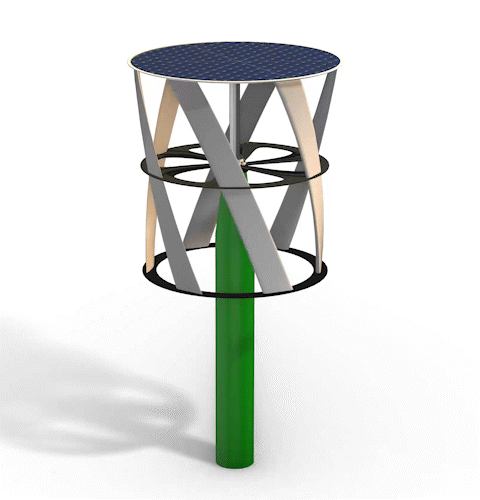
The tower is of course from parts that have already been proven to function with ability to create power so while the numbers might be over inflated for performance without knowledge of where the tests were done. One can assume that you might get 50% of the stated values.
Reading about the size the 2 m for the pole is not all that much and the total height can be just above the trees for the lowest part of the windmill. The parts can even be bought at amazon to do a prebuilt style of construction.
Vertical]Axis Wind Turbine or VAWT
A less efficient and less common turbine is the ‘Vertical Axis Wind Turbine’ (VAWT). It is referred to as vertical axis as the rotating axis is aligned vertically upwards (see diagram, below).
It is not possible to build VAWTs at the large scales we see in HAWT wind farms. The biggest VAWT ever built was the 110m tall, 3.8MW “ÉOLE” turbine in Quebec, Canada2. However the rotor bearing failed in 1993 under the 880 ton weight it had to support. It has been non-operational since then, and is now a curiosity for tourists. It is highly unlikely anyone will try to build a VAWT bigger than this due to the engineering problems associated with directly supporting such heavy weights on a single bearing.
Offline
Like button can go here
#38 2023-11-23 21:56:46
- SpaceNut
- Administrator
- From: New Hampshire
- Registered: 2004-07-22
- Posts: 29,932
Re: Vertical Wind Turbine - better than you might think
Found data for my location to see if it's even something to invest in.
https://windexchange.energy.gov/states/nh
commercial location
https://en.wikipedia.org/wiki/Wind_powe … _Hampshire
https://www.nrel.gov/grid/wind-toolkit.html
wind speeds are measured at 100-meter height.
Offline
Like button can go here
#39 2023-11-23 22:10:19
- tahanson43206
- Moderator
- Registered: 2018-04-27
- Posts: 23,502
Re: Vertical Wind Turbine - better than you might think
For SpaceNut re #37
Thanks for the image you posted of the Vertical design, and the link to the article. I read the entire article but did not find where that single bearing that failed in the large Canadian example was located. I wondered (and still wonder) why only one bearing was used. There was no reason (that I can see) for only one bearing. There could have been as many bearing as needed to support the mass of the turbine.
If you can find any additional information (such as drawings of the Canadian example) I'd definitely be interested. The engineers/designers must have had what they thought was a good reason to hang all that weight on a single bearing.
(th)
Offline
Like button can go here
#40 2023-11-24 12:38:39
- SpaceNut
- Administrator
- From: New Hampshire
- Registered: 2004-07-22
- Posts: 29,932
Re: Vertical Wind Turbine - better than you might think
Offline
Like button can go here
#41 2023-11-25 12:30:05
- SpaceNut
- Administrator
- From: New Hampshire
- Registered: 2004-07-22
- Posts: 29,932
Re: Vertical Wind Turbine - better than you might think
Heat of an attic must go somewhere so why not use it.
Turbine Vents vs. Flat Roof Vents: Which One Is Best for Your Home?
A largely arbitrary rule of thumb that's been adopted into most building codes calls for 1 sq. ft. of vented area for every 300 sq. ft. of attic space. So if an attic is 1,500-sq.-ft. it must have 5 sq. ft. of vent space, half dedicated for air intake in the soffits and the other half for exhaust on the roof.
If it rotates, we have power capability on the nano scale but its power.
Offline
Like button can go here
#42 2024-01-29 08:04:32
- tahanson43206
- Moderator
- Registered: 2018-04-27
- Posts: 23,502
Re: Vertical Wind Turbine - better than you might think
The vast majority of wind turbines feature propellers that face into the wind, turning on a horizontal axis.
kbd512 recently inquired about the practicality of using the vertical design to turn a vertical shaft that would then drive power collection equipment.
The only major vertical wind device that I've read about so far was built in Canada. It ran for some time, but eventually failed. The reason for failure (as i recall the article) was that the system depended upon a single bearing to contain the entire weight of the system, and that bearing failed.
If anyone ever tries that concept again, it would seem prudent (to me at least) to design the system so that there is more than one bearing the carry the weight. This necessarily means that power will be lost due to the need to overcome resistance of the multiple roller bearings. Magnetic "bearings" are possible, but the amount of load each can bear is limited, so a well designed system with magnetic bearings would have a great number of them.
However, there is NO reason (that I can think of) why such a system could not be built. Once built, such a wind device could operate for a long time without need for lubrication of the main bearings. There would still be a need for lubrication of the gear system that draws power from the rotating central shaft.
Happily, there is a magnetic system already patented that can be used to provide the needed support. I have forgotten the name of the inventor, but the name is documented in the forum archive. A search for the word magnet or magnetic and author tahanson43206 should yield a post containing the documentation. The system was designed and patented for warehouse use. It employed a system of permanent magnets. Each magnet bore only a part of the load, so there were a lot of them, but the resulting pallets operated without mechanical resistance. That same principle could certainly be applied to a vertical wind turbine design.
The inventor was interviewed by Dr. David Livingston in one of the episodes of thespaceshow with Dr. David Livingston.
Update: here is the post: http://newmars.com/forums/viewtopic.php … 46#p199046
The inventor is John Barber. The patent should be easy enough to find using that name and the words "magnetic" and "bearing"
I note that since the vertical wind device will require horizontal centering as well as vertical support, magnets will be needed to operate in a horizontal direction as well as vertical. Those magnets will need to be strong enough to endure the forces of whatever winds might occur, up to and including hurricane force winds.
At some wind strength, the wind device would need to be locked down, since the horizontal centering system would be designed for a range of loads, but would fail if the arriving wind is greater than the design limit. Accordingly, a means of taking the wind device offline is needed.
In reply to kbd512, Calliban confirmed that a mechanical power transmission system using a fluid might be practical, and a vertical turbine design is an alternative to the horizontal design Calliban described.
http://newmars.com/forums/viewtopic.php … 49#p218849
(th)
Offline
Like button can go here
#43 2024-01-29 08:35:47
- Calliban
- Member
- From: Northern England, UK
- Registered: 2019-08-18
- Posts: 4,271
Re: Vertical Wind Turbine - better than you might think
A vertical axis machine has the advtages of fewer moving parts and always facing into the wind without active control. Darreus type turbines that create lift are no less efficient than horizontal axis machines. But a vertical axis machine does need a robust thrust bearing supporting its weight. I don't think that is necessarily an expensive component. It needs to be supplied with lub oil, but for a ground mounted bearing that system can make use of gravity. It helps a lot that it is close to the ground, making it much easier to service.
If we are using these machines to drive hydraulic pumps, these need to be ground mounted anyway. And using a vertical axis machine avoids the need for dedicated power transmission from the hub to the pump. That is going to save a lot of cost and eliminates the need for a bevel gear, the nacelle and a tower that is seperate to the rotating shaft. So I think vertical axis machines could save cost in a wind-hydraulic power system. I do not know if there are any specific problems scaling these machines up to multi-MW sizes. One other advantage with vertical axis machines is that the blades are not experiencing cyclic loads due to gravity, as they are turning perpendicular to Earth's gravitational field. That eliminates a source of vibration.
Last edited by Calliban (2024-01-29 08:47:22)
"Plan and prepare for every possibility, and you will never act. It is nobler to have courage as we stumble into half the things we fear than to analyse every possible obstacle and begin nothing. Great things are achieved by embracing great dangers."
Offline
Like button can go here
#44 2024-01-29 20:23:01
- SpaceNut
- Administrator
- From: New Hampshire
- Registered: 2004-07-22
- Posts: 29,932
Re: Vertical Wind Turbine - better than you might think
Low rpm will be required to connect to a shaft drive with torque force from the rotation.
Of course, a higher rpm will mean lower torque.
Offline
Like button can go here
#45 2024-06-19 07:55:42
- SpaceNut
- Administrator
- From: New Hampshire
- Registered: 2004-07-22
- Posts: 29,932
Re: Vertical Wind Turbine - better than you might think
What to Know About Home Wind Turbines
Horizontal-axis turbines are the kind you see from the roadway. The turbine is enclosed in a housing mounted on a tall pole, and blades attached to the turbine shaft catch the wind and spin the shaft, which activates a gear system to spin the turbine. Horizontal-axis turbines usually have a rudder, much like the one on a weather vane, that spins the rotor to keep the blades facing the wind.
Vertical-axis turbines have a shaft that extends vertically from the ground, and the blades can be shaped like the letters "S" or "H," or they can be semicircular like the spokes on a whisk blender. The more compact design allows for installation on rooftops as well as on the ground.
Picking is determined by site review for which would be better to install.
Benefits and Drawbacks of Home Wind Turbines
Free energy from the wind? Yes, please. It's the obvious and most important benefit of home wind turbines, and when you compare them to PV panels, which also generate free electricity, they have these advantages:A budget turbine that can generate 1,500 watts of electricity occupies 10 or 20 square feet of ground space, so it's a good solution for small properties. A panel array that generates the same wattage, on the other hand, needs 80 to 150 square feet of real estate, depending on each panel's power rating.
As long as the wind is blowing, wind turbines can generate just as much power on cloudy days (and at night) as they can on sunny days.
Wind turbines convert as much as 50% of the energy they absorb from the wind into electricity. By contrast, solar panels are around 20% efficient.
The production of wind turbines releases fewer atmospheric pollutants than the production of solar panels.
All the above notwithstanding, wind turbines have serious drawbacks that can make them a less attractive choice than PV panels:Wind is unpredictable, and even though turbines work when the sun isn't out, they don't work when the wind isn't blowing.
Unlike PV panels, which are pretty much maintenance-free, wind turbines require regular maintenance, and they have moving parts that can be noisy and can break if the wind blows too hard.
Wind turbines have to be placed where the wind is blowing, which sometimes necessitates high towers or prominent roof placements. Because of the visual impact and the noise factor, they aren't suitable for densely populated neighborhoods, and some communities might be reluctant to issue permits for them.
The blades of horizontal-axis turbines create a hazard for wildlife, especially birds and bats.
Are Home Wind Turbines Worth the Investment?
If your residential situation is suitable for a wind turbine, it can be a great investment. A small wind turbine can be surprisingly affordable — as long as you don't have to mount it on a tall tower to catch the wind and rack up astronomical installation costs in the process. Vertical-axis turbines that can pump 1.5 kW of power into your solar battery bank or feed it to the grid cost less than $500.A wind turbine is a bad investment if you don't get enough wind to make it spin, but some models have very low cut-in speeds (the minimum wind speed needed to make them spin) of less than five mph, and they achieve optimal energy production at speeds around 30 mph. This is an improvement from 10 years ago, and it's the reason why we're rethinking our decision to put one on our property.
Home Wind Turbine Installation: Can You DIY?
Some turbine manufacturers advertise DIY installation, but Energy.gov advises against doing the job yourself. Choosing site placement and physically mounting the turbine are only half the job — the unit has to be hooked up to your electrical system. A pro has the knowledge to do the job according to code and will also handle the permits.
Offline
Like button can go here
#46 2024-06-19 13:30:05
- Terraformer
- Member
- From: The Fortunate Isles
- Registered: 2007-08-27
- Posts: 3,988
- Website
Re: Vertical Wind Turbine - better than you might think
Vertical-axis turbines that can pump 1.5 kW of power into your solar battery bank or feed it to the grid cost less than $500.
If you get the 30% capacity factor that onshore wind gets in Britain, that could average out to about £1/W. Obviously that's not counting storage cost, but if you're using it to drive a heat pump for a hot water tank, the actual storage shouldn't cost all that much (hot water). Payback period of... one year, maybe? If electricity prices come down.
EDIT: given that they can generate power when the wind direction is variable, would the capacity factor of VAWTs be higher? At least, higher than a fixed HAWT. Perhaps a suitably located one would be able to generate power 60, 70% of the time...
Last edited by Terraformer (2024-06-20 07:42:06)
Use what is abundant and build to last
Offline
Like button can go here
#47 2024-07-27 10:29:03
- SpaceNut
- Administrator
- From: New Hampshire
- Registered: 2004-07-22
- Posts: 29,932
Re: Vertical Wind Turbine - better than you might think
US to Trial Run Japan’s Unique Wind Turbines That Generate Power Even at 7mph
VCCTs are much shorter at only 23 feet tall, instead of nearly 400 feet, so they won’t disturb the natural landscape.
Offline
Like button can go here
#48 2024-08-12 18:30:34
- SpaceNut
- Administrator
- From: New Hampshire
- Registered: 2004-07-22
- Posts: 29,932
Re: Vertical Wind Turbine - better than you might think
Offline
Like button can go here
#49 2024-08-13 06:08:13
- tahanson43206
- Moderator
- Registered: 2018-04-27
- Posts: 23,502
Re: Vertical Wind Turbine - better than you might think
For SpaceNut re #48
Nice find!
The new wind turbine from Kanoa Winds is a cutting-edge piece of technology that promises to revolutionize the renewable energy sector. Known as the Vertical Coaxial Contra-rotating Twin blades (VCCT) wind power generation system, this turbine is designed to be scalable and efficient, capable of generating power from a wide range of wind velocities, even in typhoon wind speed conditions.
The VCCT wind turbine is unique in its design and operation. It utilizes both lift and drag to rotate two levels of turbine blades bidirectionally, producing a powerful torque. This bidirectional operation doubles their relative speed, and the structure is stabilized by a gyroscope effect, which neutralizes the counterforce incurred during rotation. This innovative design allows the turbine to operate efficiently and effectively in various wind conditions.
Technical Details of the VCCT Wind Turbine
Environmentally Friendly: The turbine has a small installation footprint and can be set up on top of buildings and factories. It operates quietly (<40dB) and avoids bird/bat strike issues. It also avoids flickering shadows and uses recyclable materials.
Efficient: The turbine captures wind direction from all angles quickly, has a low cut-in wind speed, and no cut-out wind speed, allowing for continuous power generation. It can continue operation even over 70 mph wind speed.
Complete Standalone System: The turbine requires no power during idle wind standby.
Easy Maintenance: The turbine has a simple structure and requires limited maintenance.
Durability: The turbine is durable against lightning strikes, strong wind gusts, and typhoons.
Scalable: The turbine is scalable from 0.3 – 20kW and has the potential to scale up to 1MW. It also has potential for offshore operation with a scaled version.
Semi-Knock Down Local Production: The turbine components can be imported from Japan and assembled in Hawaii. A setup installation and maintenance program is also included.The VCCT wind turbine is not just a piece of technology; it’s a solution designed to address the inherent challenges found in conventional propeller wind generators, such as low-frequency noise issues, shadow flickering, and damage due to bird/bat strikes. It’s a testament to Kanoa Winds’ commitment to creating a sustainable society against climate change.
VCCT Wind Turbine
This is the first time I've heard of a counter-rotating design. As followers of RobertDyck's Large Ship discussion are well aware, counter-rotating design is key to success of the Second Generation of Large Ship designs. The first generation (as we all recognize) is a spinning top design without counter-rotation.
The claim of reduced risk to birds is interesting. I hope the claim stands up to Real Universe testing.
(th)
Offline
Like button can go here
#50 2024-08-13 16:07:30
- Calliban
- Member
- From: Northern England, UK
- Registered: 2019-08-18
- Posts: 4,271
Re: Vertical Wind Turbine - better than you might think
This may be of interest.
https://m.youtube.com/watch?v=PGcrYonFmOA
No external moving parts.
"Plan and prepare for every possibility, and you will never act. It is nobler to have courage as we stumble into half the things we fear than to analyse every possible obstacle and begin nothing. Great things are achieved by embracing great dangers."
Offline
Like button can go here
